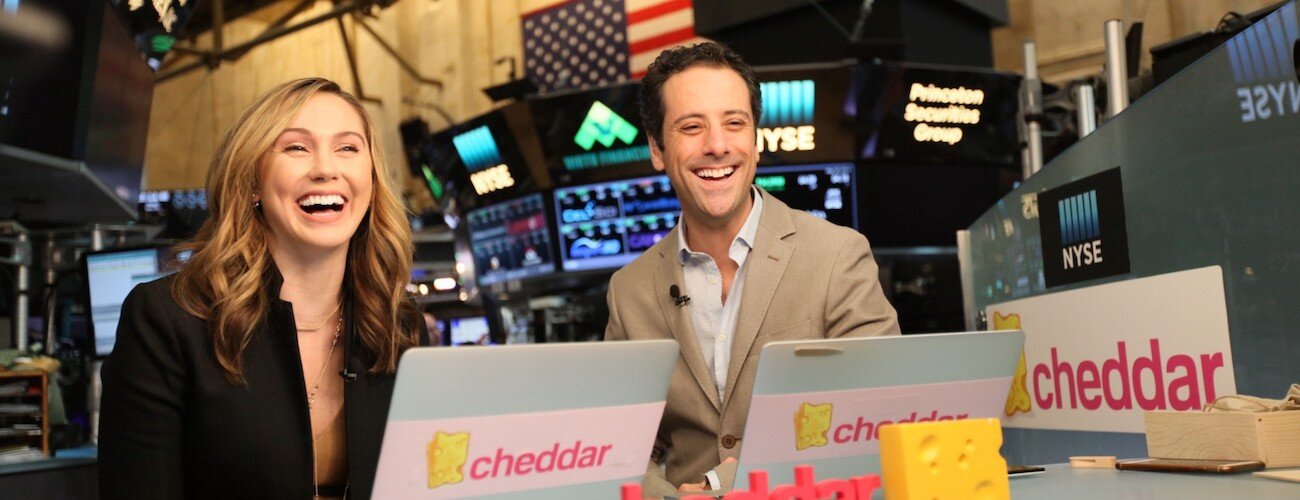The Cheddar Effect: Business News Without All the Pesky Businesses.
Business news aimed at Millennials leaves out most of the known economy. The effect on markets will be profound.
Business news is about to become a semi-oxymoron. Similar to generational shifts coming to ride-sharing, smartphones and electric cars, news about businesses aimed at the young will specifically be tailored to avoid most businesses -- if Jon Steinberg, founder and CEO of cutting edge business news video provider Cheddar, is to be believed.
We sat down for a 40-minute presser with Steinberg, mostly to hear how the former president of Buzzfeed founded Cheddar back in 2016 to be the CNBC of the post-cable generation.. And he raised $22 million in venture cash to fund a business video news service aimed at younger viewers. We have to say, Steinberg and Cheedar deserves real credit for finding a fresh niche in the impossible world of multi-platform, TV.
Cheddar is essentially available everywhere cable TV isn’t: Hulu, Sling TV, Pluto and dozens of other Web- and smartphone-based video platforms. We like the service. Cheddar’s format is the standard business news, TV vibe: Studio shots, conversations with CEOs and live takes from the floors of various exchanges. Save one thing. No more old fat white people. Cheddar features younger and hipper hosts, with lots of fabulous diversity and a fun sense for what matters to younger people. Anchors like Nora Ali, JD Durkin and Vanessa Freeman are crushing it.
Its news is timely, gym-worthy – and it breaks stories. One if its young reporters, Alex Heath, won the prestigious Birger Award for young journalists from the Society of Advancement of Business Editors and Writers, beating out the best and brightest from traditional platforms like Bloomberg, The New York Times, and many others. Cheddar is tasty indeed.
But here is the darker professional investor thing: Steinberg was unequivocal – Cheddar will always caters to younger audiences with lavish coverage of the companies they know and love: Operations like Google, Tesla, Amazon, and lots and lots of Apple. But it will not cover other sectors like energy, oil, mining, healthcare, and government spending.
Digest that for a moment. What happens to the lifeblood of markets, that is information, when anything that isn’t Facebook or Twitter is not considered information.
How will we, the professional money managers -- who gets paid to manage the narrative of information flowing through markets -- manage the flow of value, when most of what we are valuing is not given mindshare.
To consider the scale of what is going dark in business information, just wander through the Bureau of Economic AffairsGDP tables on different industry sectors and its share of our Gross Domestic Product.
Just consider what won't be considered: Forestry, Electric Power, Commercial Office Developering, Wood Products. Fabricated Metal (except we assume the bits in the iPhone, of course), Furniture, Food and Beverage, Finance and Insurance, Amusement Parks. The Defense Industry. None of it will be considered newsworthy. Ever!
Back of the Envelope, out of a roughly $14 trillion in North American GDP, total guess will thing $10 trillion of it, will not be covered by Millennial news services like Cheddar. And most of what we do all day will be nothing more than a faint “Gee I wonder what that is,” in the mind of misinformed kid, pulling the trigger on homes, investments and a college education.
You read it here first: Our jobs will no longer just be about betting on what the other guy or gal doesn't know. It will be about betting on what that poor sucker doesn't want to know.
And won’t that be spooky?



